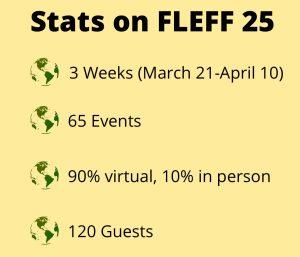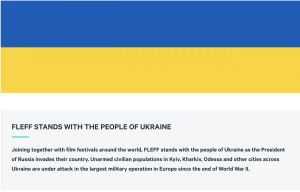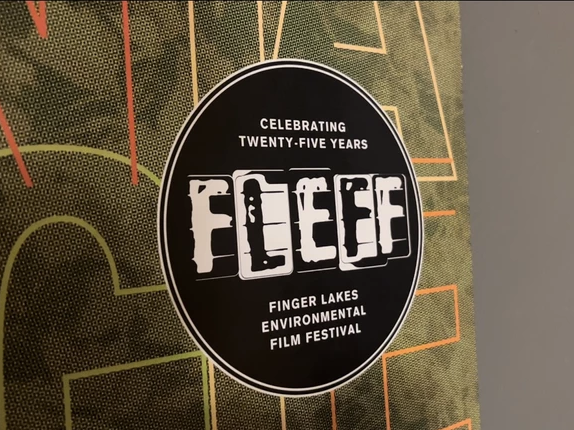This year’s festival is three weeks long, running from March 21 to April 10. The festival is a 90% virtual format with a select number of events held in person on the Ithaca College campus. The festival features 65 events and around 120 guests.
Festival director, Dr. Patricia Zimmerman, professor of Screen Studies, said the mostly virtual format was a conscious decision based on various factors including what the team could handle. This year’s festival has 40 staff members made up of alumni, current students and professional producers who help orchestrate the event.
“Because what we realized is going on Zoom, we could do some things that we weren’t able to do before,” Zimmerman said. “So our decisions were made on what were some issues we had before, and how can we resolve them now.”

Zimmerman said some of these issues include student engagement and time. The virtual format allows guests to have more time to showcase their work and talk about it more in-depth. People from around the globe are also able to attend the festival.
“Festivals are places where you get together with other people and you explore the unknown through intellectual life,” Zimmerman said. “So when we went on Zoom, our model was multiplied by three. If it was 20 minutes, make it an hour. If it’s one week, make it three weeks. You need to expand when you go digital.”
By expanding the timing of the festival and sticking to a virtual format, the festival was accomplishing things it had not been able to before. Zimmerman said that data from last year’s virtual festival shows that participation quadrupled.
“You’ve expanded your audience, you’ve expanded your accessibility for disabilities and you were able to, here in little tiny Ithaca, New York go massively global,” Zimmerman said.
FLEFF 25
The expansion comes during an important milestone for the festival. This year celebrates FLEFF’s 25th year anniversary which Zimmerman said is a big deal.
“We’re about the new and the emerging,” Zimmerman said. “So it’s very significant to make it to 25 years because a lot of festivals survived five years, 10 years. This is a very successful festival; it’s known around the globe.”
Zimmerman said that FLEFF is in a unique position as they have an advantage in terms of survival based on their connection to the college.
“We have an advantage in terms of surviving because we’re not a standalone festival,” Zimmerman said. “The college is one of our sponsors. I’m on the faculty [and] a lot of people are professors. So we are part of an academic institution.”
Zimmerman said that the festival would not be possible without the support of the college and faculty from all across the school contributing ideas and time to FLEFF.
“But in the end, what truly matters is sharing ideas together with a ferocity and a sense of courage,” Zimmerman said. “Because ideas will save us in the end.”
Entanglements Theme and Ukraine
The festival’s theme this year, ‘Entanglements,’ combines ideas across various disciplines. Zimmerman said that the theme explores the entanglements of the environment, politics and other areas and how they interact together.
“So this theme of entanglement comes from science,” Zimmerman said.” It also comes from contemporary environmental theory, particularly in Environmental Humanities, to look at the ways ideas, people, the nonhuman nature, species, and conflicts are always enmeshed and entwined.”
Zimmerman said that this theme is also in line with the way FLEFF typically structures its festivals as an entanglement of various forms of media and voices.
“I think it really epitomizes what we do at FLEFF, because we have film, and we have filmmakers and film producers, but we also have scholars,” she said. “We have musicians, we have artists, we have creative writers, we have journalists. We have narrative filmmakers, … people looking at documentary experimental strategies and new media. So in some ways, we’re entangled just as a festival.”
The festival this year is able to use its content to spark conversations on current events such as COVID-19 and global climate disruption. Zimmerman said an issue that was close to her heart was highlighting the current war in Ukraine.
“You have an ethical, political, moral and intellectual obligation to embrace the world in all of its complexity, and to bring the world to your audience and your audience to the world,” Zimmerman said. “It is your job. So as that war happened, we had no choice but to engage it.”
The festival incorporated the Ukraine conflict by creating playlists to be posted on the festival’s website. The playlists include books, films and music which Zimmerman said was created in about four days right before the festival.

Dr. Rachel Schaff, assistant to the FLEFF director and assistant professor of Screen Studies, said she worked with other Ithaca College faculty to contribute to the film section of the playlists. Her role was to help research titles, select films, find where to stream them, and select images.
Schaff echoed Zimmerman’s ideas saying that it was crucial to highlight Ukraine in this year’s festival. “It is impossible and irresponsible to ignore the war in Ukraine,” Schaff said. “As we say in the introduction before every FLEFF event: the world is our why.
The playlist has made it to an international audience by being featured in St. Andrews Centre for Screen Cultures Playlist initiative which is located in Scotland.
FLEFF Course at Ithaca College
Schaff also teaches a course in conjunction with the festival called “FLEFF Festivals.” There are currently 25 students enrolled in the course, who are designated as FLEFF Fellows and FLEFF Brand Ambassadors.
The students are each assigned an event to follow closely and share details about on the FLEFF Instagram.
One student in the course, Roxanne Palladino, chose to cover an event sponsored by i-Docs, which is a research network exploring interactive and immersive documentaries. Palladino said she was interested in this event as it was not just focused on traditional film documentaries but other avenues of storytelling, including virtual reality.
Palladino said she enrolled in the class because she wants to get the hands-on experience that Ithaca College has to offer its students.
“The opportunity to meet people and see all these things,” Palladino said. “They’ve got people from all over the place, especially because it’s online. I just attended an event with a filmmaker from Abu Dhabi. I would not have met her [without FLEFF].”
Schaff said she enjoys teaching the course as she believes it is valuable for students to experience media across multiple platforms and engage with people from all over the world.
“FLEFF is an exciting and unique festival experience,” Schaff said. “Put simply, FLEFF allows students to engage with cinema culture and intellectual life both within and beyond the college.
Zimmerman said that overall, the festival aims to bring the world to Ithaca, and Ithaca to the world.
“It would be reprehensible to me to be a professor here and a festival director and to not embrace the world in all of its current complexity,” Zimmerman said. “It is our obligation as intellectuals and artists, faculty, students and administrators to provide space to discuss these very dire dangerous times we are in.”







